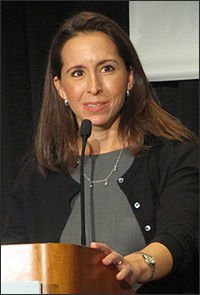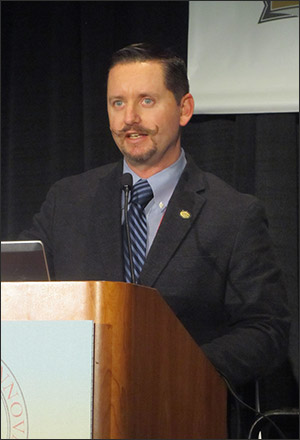Human Resource Management on the Ranch
Cattlemen's College® session offers insight into finding, keeping good employees.
SAN DIEGO, Calif. (Jan. 27, 2016) — Kim McCuistion and Ryan Rhoades, both with the King Ranch Institute for Ranch Management (KRIRM) at Kingsville, Texas, addressed the topic of human resources on ranches during breakout sessions at the 2016 Cattlemen’s College® Jan. 27 in San Diego, Calif.
 “We need to hire the right people and keep the right people on the ranch when we find them,” said Kim McCuistion.
“We need to hire the right people and keep the right people on the ranch when we find them,” said Kim McCuistion.“In an industry that is shrinking in number of cattle and people, it is becoming increasingly difficult to find and replace employees,” McCuistion noted.
Plus, it’s costly. She shared that it is estimated to cost 50% to 150% of the annual salary of the position to replace an employee.
“We need to hire the right people and keep the right people on the ranch when we find them,” McCuistion said. To find quality employees, she suggested asking current employees if they recommend anyone, or partnering with neighbors to share labor.
Once employees are hired, Rhoades emphasized the importance of keeping them informed and engaged with the operation.
“Engagement equates to retention,” he stated.
From a survey of ranch employees conducted by KRIRM, the majority of employees indicated the top two factors that influenced job satisfaction were having the tools and information necessary for the job and clearly understanding performance expectations (i.e., how they will be evaluated.
Rhoades says the survey surprisingly revealed that a lower priority for employees was having a job that offered ranch work opportunities for family or on-ranch recreational opportunities for family. “We thought this would rank higher; that was surprising,” Rhoades shared.
 Ryan Rhoades emphasized the importance of defining the job with a written job description. He said, “The job description is a contract, which explains how to train, evaluate, award and discipline … so it can do a lot of things for you.”
Ryan Rhoades emphasized the importance of defining the job with a written job description. He said, “The job description is a contract, which explains how to train, evaluate, award and discipline … so it can do a lot of things for you.”Regarding helping employees better understand performance expectations, Rhoades emphasized the importance of defining the job with a written job description. He said, “The job description is a contract, which explains how to train, evaluate, award and discipline … so it can do a lot of things for you.”
Along with that, he noted the importance of performance reviews, and said that these reviews help communicate to employees that management cares about their progression. He shared data from a Gallup poll that found when employees have timely performance reviews it results in 15% more productivity and 20%-40% fewer accidents.
“So, there’s a money factor here,” Rhoades said.
He added, “The beef industry is not doing a very good job of providing performance reviews or training to employees. This is an area that the industry needs to work on.”
He shared research that indicates for optimal employee performance, positive feedback should occur five times more frequently than negative feedback.
“This means performance reviews need to happen more than one time a year, and they should not be only about what someone did wrong. If you are constantly negative with a person, how invested are they?” asked Rhoades. Instead, he advised, fostering a relationship with employees that allows for positive and negative feedback on a regular basis. “You have to have frequent conversations with employees,” he concluded.
The King Ranch Institute for Ranch Management will offer a lectureship on the topic of "Human Resource Management for Ranches" in September 2016. For more information visit http://krirm.tamuk.edu/lectureships/hrmanagement/.
Editor’s Note: The articles used within this site represent a mixture of copyrights.This article was written by or under contract of the Angus Journal, an Angus Media publication. If you would like to reprint or repost the article, you must first request permission by contacting the editor at 816-383-5270; 3201 Frederick Ave., Saint Joseph, MO 64506. The Angus Journal claims copyright to this website as presented. We welcome educational venues and cattlemen to link to this site as a service to their audience.

